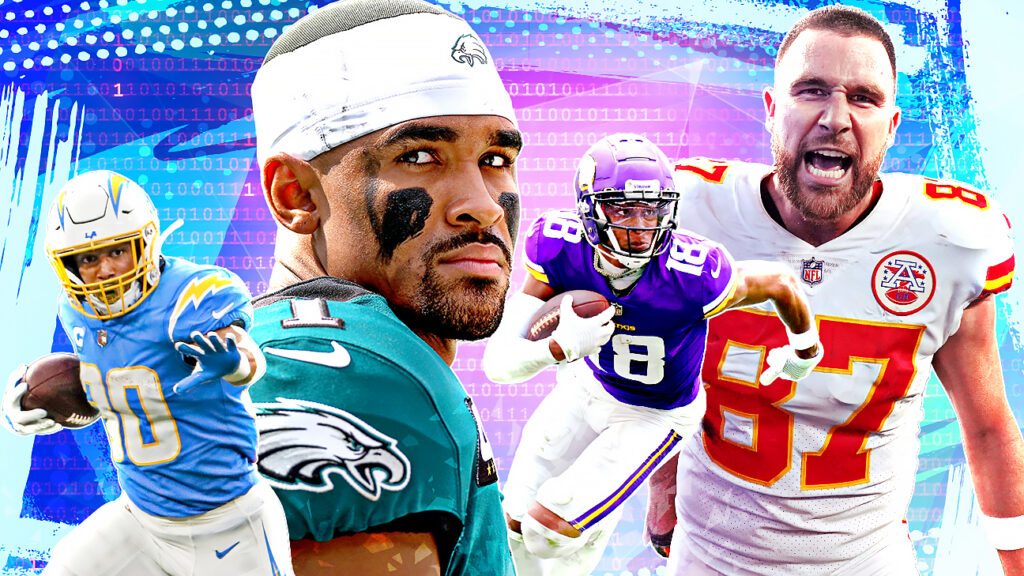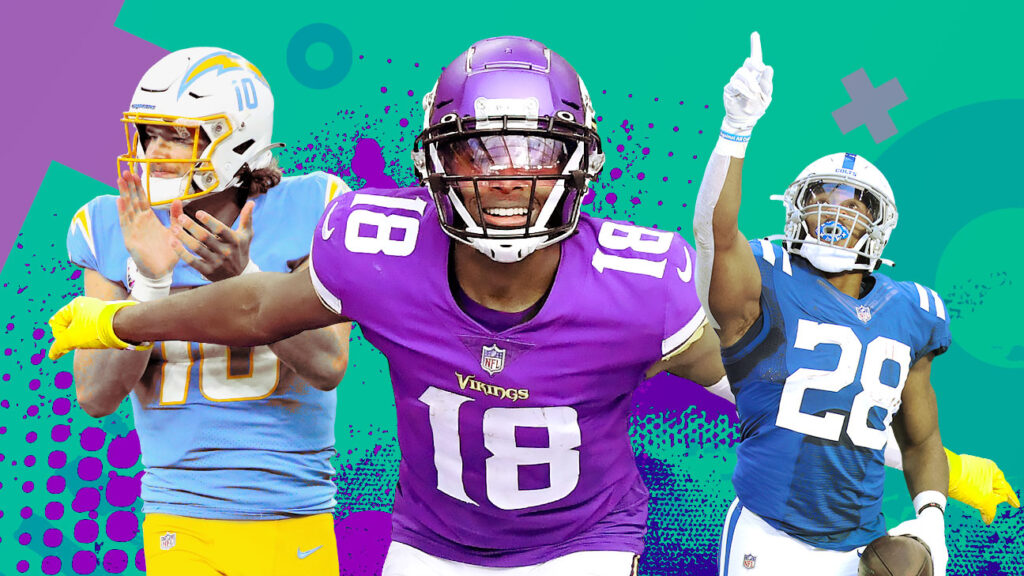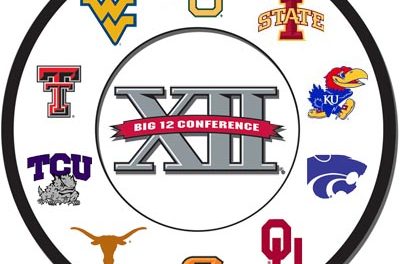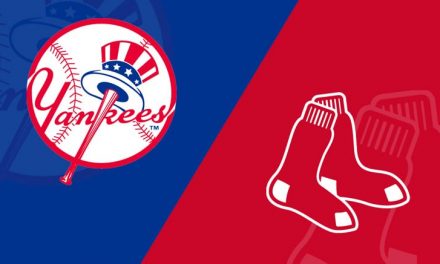We’re not shy of a bit of competition amongst ourselves here at That’s All Sport. One of the ways we pit ourselves against each other is through fantasy leagues in different sports.
One newer one to us is Fantasy NFL (Fantasy Football to Americans). To us Brits, it has taken a full season to get our heads around it and understand how it works. So what better way to use that knowledge than to share it? Fantasy NFL is actually (in my opinion) way more straightforward than, say, Fantasy Premier League. It’s just different.
So, here’s our guide on how to get to grips with the world of Fantasy NFL.

What is Fantasy NFL?
Think of fantasy football as being the general manager of your own dream team. You’ll draft real NFL players, and their actual performance in games (think touchdowns, yards, interceptions, etc.) will earn your fantasy team points.
You compete against other “managers” in your league, and the goal is to score more points than your opponent each week to win your matchup.
Getting started: The basics
Finding a league
First things first, you need a league to join.
Most people play with friends, family, or co-workers. If you don’t have an existing league, you can often find public leagues on platforms like ESPN, Yahoo, or NFL.com. These platforms provide all the tools you need to play.
Draft Day
This is where the fun begins! The draft is when you select your players. Leagues typically have a snake draft where teams pick in a set order in the first round, then reverse that order in the second, and so on. For example, if you pick first in Round 1, you’ll pick last in Round 2.
Your goal is to build a well-rounded team with players at different positions. A typical roster will include:
- Quarterback (QB): The player who throws the ball.
- Running Backs (RB): Players who run with the ball and catch passes. You’ll usually need two of these.
- Wide Receivers (WR): Players who primarily catch passes. You’ll usually need two or three.
- Tight End (TE): A hybrid player who blocks and catches passes.
- Flex (RB/WR/TE): An extra spot where you can play a running back, wide receiver, or tight end.
- Kicker (K): Kicks field goals and extra points.
- Defence/Special Teams (D/ST): The entire defensive and special teams unit of an NFL team.
- Bench Players: These players don’t score points for you unless you move them into your starting lineup. They’re good to have for injuries, bye weeks, or potential breakouts.
Scoring
Points are awarded based on how your real-life players perform. While scoring systems can vary slightly between leagues, here are some common ways players earn points:
- Passing Touchdowns: QB scores points for throwing a touchdown.
- Passing Yards: QBs get points for every set amount of passing yards (e.g., 1 point for every 25 yards).
- Rushing Touchdowns: RBs score points for running into the end zone.
- Rushing Yards: RBs get points for every set amount of rushing yards.
- Receiving Touchdowns: WRs and TEs get points for catching a touchdown.
- Receiving Yards: WRs and TEs get points for every set amount of receiving yards.
- Receptions (PPR leagues): In “Points Per Reception” (PPR) leagues, players get an extra point (or half point) for every pass they catch. This makes wide receivers and pass-catching running backs more valuable.
- Interceptions Thrown (negative points): QBs lose points for throwing an interception.
- Fumbles Lost (negative points): Players lose points for fumbling the ball.
- Field Goals: Kickers get points for successful field goals (more for longer kicks).
- Extra Points: Kickers get points for successful extra points.
- Sacks (D/ST): Defences get points for sacking the opposing quarterback.
- Interceptions/Fumble Recoveries (D/ST): Defences get points for turnovers.
- Defensive Touchdowns (D/ST): Defences score points if they return an interception or fumble for a touchdown.

Managing your team during the season
The draft is just the beginning! Here’s what you’ll do week-to-week:
- Set Your Lineup: Before each NFL game week, you’ll need to select which players from your roster will be in your starting lineup. Make sure to check for injuries, bye weeks (weeks when a team doesn’t play), and favourable matchups.
- Waiver Wire: The waiver wire is a pool of players not currently on any team. You can pick up new players from the waiver wire to improve your team or replace injured players. There’s typically a priority system or a “free agency” period where you can add players.
- Trades: You can also trade players with other managers in your league. This is a great way to acquire players you need or offload players you don’t.
With Fantasy NFL, you can see projected points for individual players and your overall team. So it makes life much easier than other fantasy leagues/sports. You have a player looking like they’re going to get a low score? Swap for one of your players on the bench, or take them out of the team and pull in a free agent with a better projection to fill the gap.
In a lot of leagues, you’re not limited by player costs and trades. Other managers can get involved and look at the players going back and forth, perhaps getting involved and scuppering a trade or two. But players are your commodity and your means to points. So check regularly and swap regularly.

Strategy tips for beginners
- Do Your Research: Before and during the season, stay updated on NFL news, player injuries, and team performances. Many fantasy football websites offer player rankings, projections, and analysis.
- Understand Your League’s Scoring: Knowing your league’s specific scoring system (especially if it’s PPR or standard) is crucial for drafting and making weekly decisions.
- Don’t Overreact: One bad game doesn’t mean a player is terrible. Be patient, but also be willing to make changes if a player consistently underperforms.
- Have Fun! Fantasy football is meant to be an enjoyable way to engage with the NFL. Don’t take it too seriously, and enjoy the competition and camaraderie with your league mates.
- Play Madden? – One of my personal favourite things to do is get stuck into a few games of Madden NFL and get a feel for players in your favourite team. Sure, it isn’t foolproof. But how do they perform against some of the other teams in the league? Sports games can always aid you in some way!
Ready to draft your championship-winning team?
For more NFL content, click right here. For more on fantasy sports, click here.






Trackbacks/Pingbacks